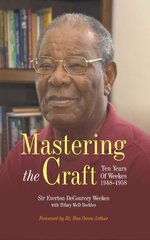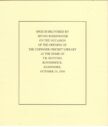Mastering The Craft
Martin Chandler |Published: 2007
Pages: 207
Author: Weekes, Everton
Publisher: University of the Caribbean Press
Rating: 3.5 stars

Everton Weekes’ figures are hugely impressive. Over ten years and 48 Tests he averaged 58.61. Twice, in Australia and New Zealand in 1951/52 and England in 1957 he was expected to play despite being some way short of full fitness. If those series are removed from his record then his average rises to 74 from 36 Tests, a mark that is more than 20% higher than that of Graeme Pollock, currently second to Bradman’s 99.94 in the all-time list.
It has always surprised me that a book about Weekes took so long to emerge, this 2007 published volume being, a pamphlet in the ACS Famous Cricketers series apart, the first. No less odd is the fact that Mastering the Craft has, to the best of my knowledge, been published only in the Caribbean. I have never seen a copy on sale in the UK, whether in a book shop or a specialist dealer’s catalogue, although for anyone interested copies are available via The Book Depository.
Weekes’ co-author is Hilary Beckles, who has written a short preface, but who otherwise gives no clue as to who he is. I have other books in my library that Beckles has written, and am therefore able to confirm that he is an academic, more specifically Professor of History at the University of West Indies, and he enjoys several other titles as well. This is a curious feature of the book as most “ghosts” are journalists, who write with at least a nod towards the commercial prospects of what they are working on. It is unusual to see a cricketer’s autobiography that is clearly intended (and if Wikipedia is correct is) to be used in the world of academia as much as providing a valued gift for cricket tragics.
So how does Mastering the Craft measure up? It is not entirely straightforward to be objective but ultimately it is a rather frustrating piece of writing, that is in some ways in the five star category, but is let down by a few irritating shortcomings.
But I will begin with the plus points. The book is, as is to expected in light of Beckles’ background, extremely well written. It is also clear that, and this is not always the case with cricketers’ autobiographies, both subject and writer have a deep and profound love of the game and knowledge of its history. The balance between what I will describe as the purely cricketing content and the accompanying commentary on the social history of the period is beautifully struck. His humble origins notwithstanding Weekes clearly was and is a highly intelligent man, and Beckles manages to make his very firm views on a number of controversial issues quite clear without ever doing so with polemic arguments.
Turning to the drawbacks as in all such volumes the absence of a statistical appendix is disappointing, as is the lack of an index. Those deficiencies might be regarded as nit-picking but rather more worrying is the poor quality of the reproduction of what could have been a good selection of photographs. As to the narrative content there are a few examples of repetition, something I always find unsettling, and I would have liked to have known rather more about the possible litigation against the West Indies Cricket Board that was considered on behalf of Weekes in 1958. What I found most frustrating however is the fact that Weekes story effectively stops in 1958. There is a closing chapter dealing with a few of Weekes’ thoughts on the modern game, but absolutely nothing on what he had done in the half century since his retirement from Tests.
It would have been fascinating to know Weekes’ view on the West Indies decline in the 21st century, but that is only mentioned in passing as the book closes. In addition, particularly as he played for a West Indian side that had little pace bowling of note, I would have been interested on Weekes’ take on the pace batteries of the 1980s. I suppose we may yet see another book comprising the thoughts of Everton Weekes on these and other issues that have arisen since his playing days, but I would still prefer it if they had been gathered together here.






Leave a comment